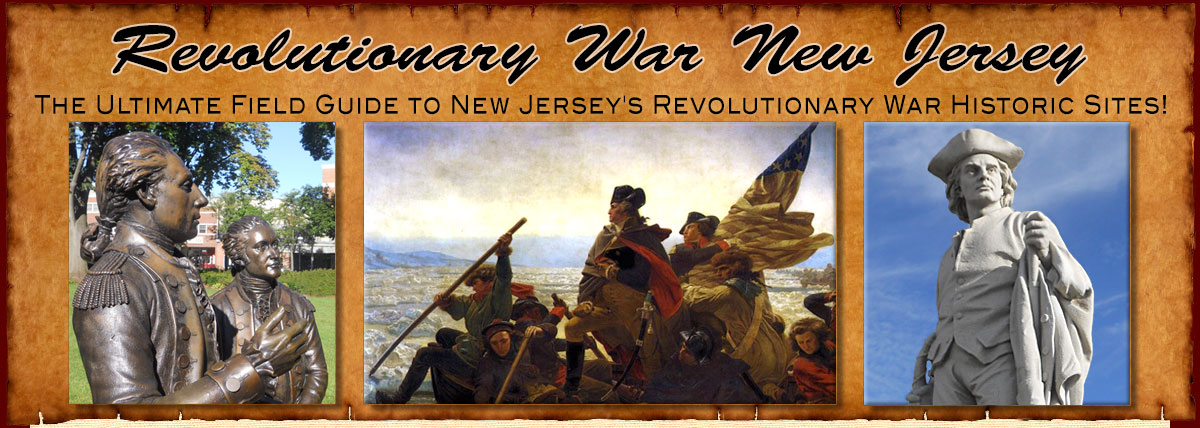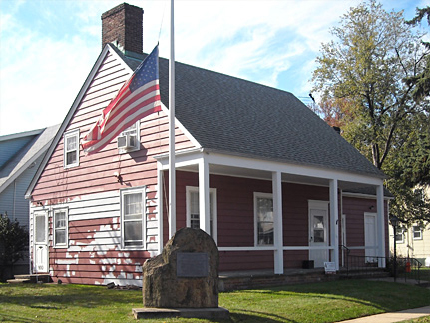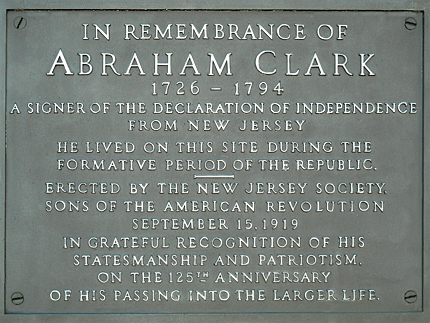

As an Amazon Associate I earn from qualifying purchases.


Abraham Clark House
101 West Ninth Ave.
Map / Directions to the Abraham Clark House
(908) 245-1777
This house is a replica of the home of Abraham Clark (February 15, 1726 - September 15, 1794), a signer of the Declaration of Independence. The original house, which stood a block away on Crane Street, was destroyed in 1900 by a fire. This replica house was built in 1941. [1]
As a delegate to the Continental Congress in 1776, Abraham Clark was one of five delegates who signed the Declaration of Independence representing New Jersey. The other four were:
• John Hart, whose house and gravesite are in Hopewell.
• Francis Hopkinson, whose house is in Bordentown.
• Richard Stockton, whose home, Morven and his gravesite are both in Princeton.
• John Witherspoon, who lived at the Maclean House in Princeton, and is buried at the Princeton Cemetery.
On the morning of July 4, 1776, before the meeting of the Continental Congress that would officially adopt the Declaration of Independence, Abraham Clark expressed his thoughts in a letter to his friend Colonel Elias Dayton: [2]
"Our Congress Resolved to Declare the United Colonies Free and independent States. A Declaration for this Purpose, I expect, will this day pass Congress, it is nearly gone through, after which it will be Proclaimed with all the State & Solemnity Circumstances will admit. It is gone so far that we must now be a free independent State, or a Conquered Country."
(Clark's capitalization has been left uncorrected. The emphasis on Free and Independent States is from the original. It has not been added.)
The following day, Clark sent a copy of the completed Declaration of Independence to William Livingston, who was then a Brigadier General of the New Jersey Militia, and he would soon become the first elected Governor of New Jersey. Clark's letter to Livingston stated: [3]
"I enclose a Declaration of Congress, which is directed to be Published in all the Colonies, And Armies, and which I make no doubt you will Publish in your Brigade." (Clark's capitalization has been left uncorrected.)
Abraham Clark continued to serve in the Continental Congress from 1776-1778, and then again in 1780-1783 and 1786-1788. He later served in the United States House of Representatives in the Second and Third Congresses (during the presidency of George Washington) from March 4, 1791, until his death on September 15, 1794. [4]
Abraham Clark is buried at the Rahway Cemetery in nearby Rahway, along with his wife Sarah and three of their sons who fought in the Revolutionary War, Aaron, Andrew and Thomas. Roselle's Abraham Clark High School, which is located several blocks from here, is named in his honor. The nearby Clark Township is also named for him. [5]

1. ^ Four Centuries in a Weekend brochure / (Union County Board of Chosen Freeholders, 2014) p. 27
• Note that during the time of Abraham Clark's life, there was no borough of Roselle. At the time, this area was still part of the larger Elizabethtown tract. Elizabethtown was originally much larger than modern-day Elizabeth, encompassing all of what is now Union County. For more about this, and Elizabethtown's role in the Revolutionary War, see the First Presbyterian Church and Cemetery entry on the Elizabeth page of this website.
Roselle was formed in 1894 from portions of Linden, which itself had been formed in 1861 from portions of Elizabeth, as well as portions of Rahway and Union Townships. For more details, see:
John F. Snyder, The Story of New Jersey's Civil Boundaries: 1606-1968 (Trenton: Bureau of Geology and Topography, 1969) p. 237 - 242 Available as a PDF on the State of New Jersey website here. Please note that it is on page 237 - 242 of the original printed document (as seen in the page numbers on the bottom of the pages), but it is on page 220 -225 of the PDF document.
2. ^ Paul H. Smith, Editor, Letters of Delegates to Congress, May 16 - August 15, 1776 (Washington D.C. : Library of Congress, 1979) p. 378-379 Available to be read at the Internet Archive here.
▸ The recipient of this letter, Colonel Elias Dayton, is buried in the First Presbyterian Church and Cemetery in Elizabeth.3. ^ Paul H. Smith, Editor, Letters of Delegates to Congress, May 16 - August 15, 1776 (Washington D.C. : Library of Congress, 1979) p. 391 Available to be read at the Internet Archive here.
4. ^ Biographical Dictionary of the United States Congress
5. ^ The Township of Clark was formed from part of Rahway by an Act of the State of New Jersey Legislature on March 23, 1864:
Acts of the Eighty-Eighth Legislature of the State of New Jersey (Newark: Printed by E. N. Fuller, Daily Journal Office, 1964) pages 369 - 371 Available to be read at Google Books here.
▸ Both the Clark Township website and Origin of New Jersey Place Names state that Clark Township was named for Abraham Clark.
Origin of New Jersey Place Names was originally compiled by the Federal Writers' Program of the Works Projects Administration in the State of New Jersey in the 1930s, and reissued by the New Jersey Public Library Commission in 1945. Available as a PDF here.